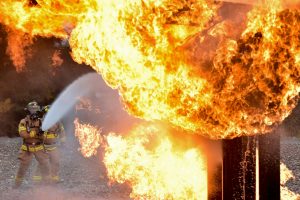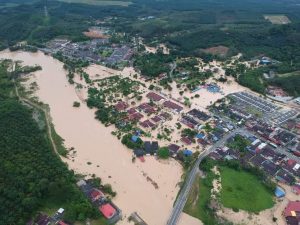Wednesday, 12 February 2020
Suppose your business premises caught on fire due to a faulty electrical connection. Creating a massive loss and damage to your building, equipment and content. As a consequence, you are unable to operate for a period of time and this jeopardises your business and your employees’ livelihood.
Without having sufficient financial resources to pay for the repairs, any business owner in such circumstances, would be at risk of ceasing operations or even closing down your business. Fortunately, businesses can easily avoid such stressful situations by selecting fire insurance and other complementary coverage.
 What is Fire Insurance?
What is Fire Insurance?
Fire insurance cover damages or losses to your business premise, equipment and furniture caused by a fire, lightning and explosions.
The coverage is classified to the following three categories:
- Buildings (offices, factories, shopping complexes, etc.)
- Stocks (raw materials, goods, packaging materials, etc.)
- Contents (furniture, fittings and fixtures, office equipment, documents, etc.)
Business owners can also extend its basic fire coverage to protect their business from the following risks:
- Impact damage, earthquake, volcanic eruption
- Flood, bursting or overflowing of water tanks/pipes
- Subsidence and landslips
- Malicious damage
- Riots and strikes
- Loss of rent
- Architects’, surveyors’ and engineers’ fees
- Removal of debris
- And more many (depending on the insurance provider)
*The premium may vary depending on selected cover and coverage amount.
Consider complementary coverage
During such unfortunate times, you might be forced to close your business operations. Nevertheless, you could still have coverage for various expenses such as rent and wages which are not covered by your fire insurance. To do so, you should also opt for the Business Interruption Insurance / Fire Consequential Loss insurance to complement your fire insurance policy.
The fire consequential loss insurance or business interruption insurance covers the following upon business interruption:
- Loss of profits
- Revenue
- Rental
- Standing charges
- Wages or salaries on payroll basis
- Increase cost of working due to business interruption as a result of fire and/or other extended perils
* View additional covers with your preferred insurance provider
Are you underinsuring your business?
If you already have business insurance policies required to protect your business, then ensure that the coverage is sufficient to cover your business’ full value. Whilst you may be required pay a higher premium – you can be rest assured that your future is well protected in the event of massive fire losses.
If you have a business and are not sure where to start – don’t worry, just view the convenient SME packages based on your business which includes fire insurance as one of its components.
Like this post? Subscribe below to check out more interesting articles relating to business and insurance.
Stay Updated!
Get instant access to the latest news, updates and more.
By: iBizcover.com
Find the right insurance for your business
Already know what you need?
Stay Updated!
Get instant access to the latest news, updates and more.
ADVERTISEMENT








